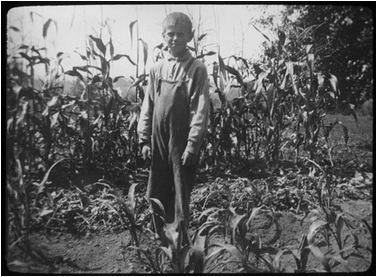by David P. Rosenberg, M.P.A., Senior Reference Librarian – Collections, Center for Jewish History

Boy in corn field, Woodbine, New Jersey (ca. 1900)
American Jewish Historical Society. Click here for more information.
One interesting work I found puts the subject into context in a similar fashion but in more detail than the Wikipedia article. Revisiting Jewish Environmental Education has Five Jewish Values on the environment:
- Seder B’reisheet (The order of creation) reminds us that “As living creatures and part of God’s creation, we are connected to all other living beings and to the earth.”
- Bal Tash’hit (Do not waste) is explained in the original form from Deuteronomy regarding fruit trees during wartime and in the broader modern Rabbinical interpretation.
- Shomre Adama (Keepers of the Earth) is explained in terms of how the concept “lies at the foundation of the modern concept of sustainable living and lifestyles.”
- Tza’ar Ba’alei Hayyim (The pain of living things) expounds many of the laws concerning the treatment of animals. Examples given include farmers feeding their animals before they feed themselves, the ideas behind kosher slaughter, animals resting on the Sabbath, mother birds being scared away before taking eggs, and the prohibition against killing an animal and its young on the same day.
- Brakhot (Blessings) that many Jews say regarding food from the earth or trees and phenomenon such as seeing a rainbow.
The work continues with exercises to teach children about environmental issues. I liked the “Environmental Beit Din: How should this land be used” exercise with study texts and “Activities for Hikers to do in the Outdoors” from Spirit in Nature: Teaching Judaism and Ecology on the Trail.
Studies in Jewish Civilization – The mountains shall drip wine: Jews and the Environment has several interesting articles. “What’s Jewish about Jewish Environmentalism?” by Alon Tal is a more scholarly approach to the topic as a whole, and it brings up several interesting points. The first one is the idea, held by some Jewish scholars, that “culturally, at least, being Jewish has very little to do with bonding with the natural world, preserving ecosystem integrity or preventing pollution.” This idea is explored and then countered by the author’s own view that “most scholars, and surely those attending this auspicious symposium, would argue that the principal message in traditional Jewish texts is an extremely green one.” The idea that Jews are “stewards of the earth” is supplemented with the mystical “holy sparks” view that there is holiness in every object. The author also presents “five things that make Jewish Environmentalism Jewish.” The first is the textual support for protective positions and the last is the concept of tikkun ‘olam – or mending the world.
The over 500-page-long Judaism and ecology : created world and revealed word includes articles ranging from “A Kabbalah for the Environmental Age,” “The Ecology of Eden,” “Jewish Death Practices,” “A commentary on the relationship of humans to the natural world,” “Concepts of Torah and Nature in Jewish thought,” “Respect for Nature in the Jewish tradition” and “Jewish Environmentalism: Past Accomplishments and future challenges.”
The Jewish sourcebook on the environment and ecology expounds on almost every imaginable connection between Judaism and the environment. The laws of “do not destroy” (mentioned above) are explained in detail, including how even fruit trees may be cut down if they are damaging other crops or if the wood is worth more than the produce—but, the text explains, the wood used for the tabernacle in the wilderness was not made out of fruit-bearing trees. Tithes, sabbatical years, plants used for healing remedies, and nature names are also explored.
An article in The environment in Jewish Thought and Law (held by YIVO) contains “A halachic perspective of environmentalism and Ecology,” which comes to the conclusion that “In summary, Jewish law forbids polluting or damaging the environment. This is certainly true regarding such overt acts as dumping sewage into the sea etc. In addition, Jewish law also forbids passive pollution, i.e. not recycling a recyclable commodity.”
You can conduct your own search for material on Jewish approaches to the environment by clicking here.
